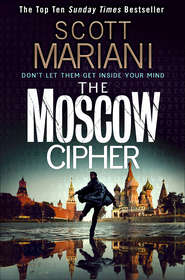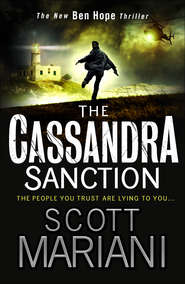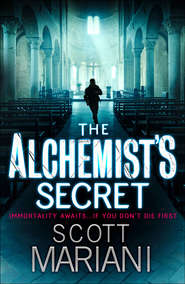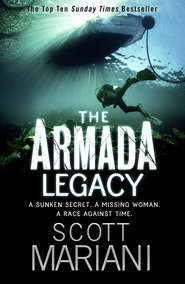По всем вопросам обращайтесь на: info@litportal.ru
(©) 2003-2024.
✖
The Doomsday Prophecy
Автор
Год написания книги
2019
Настройки чтения
Размер шрифта
Высота строк
Поля
‘Are you all right?’ Ben asked Lucy.
She looked up at him. Her eyes were wet in the darkness. ‘I can’t believe what you just did. How did you do that?’
‘Let me walk you home,’ he said.
Chapter Twelve (#ulink_1f669def-08c1-5aea-9a8f-1cb9eb2c87be)
The seventh day
The Bradburys lived in a large Victorian semi-detached house on the edge of the leafy suburb of Summertown. Ben arrived at twelve thirty with a bottle of wine and some flowers for Jane Bradbury. He hadn’t seen her in a very long time. Physically, she’d changed little, other than some grey streaks in her dark hair – and he thought he could see a certain fragility in her thin frame that hadn’t been there before. He remembered her as a quiet woman, slightly in the shadow of her ebullient husband. But today she was even quieter than he recalled.
Lunch was served on the patio at the rear of the house. The garden hadn’t changed much in almost two decades. Tom Bradbury’s rose bushes were even bigger and more colourful than Ben remembered, and the high stone walls around the edge of the garden were now covered in ivy.
After lunch they sat and sipped wine and made small talk for a while while the Bradburys’ Westie, a sturdy little white terrier, all muscle and hair, ran to and fro across the lawn, sniffing through the grass on the trail of something. ‘That dog looks exactly like the one you had last time I was here,’ Ben said. ‘Surely it can’t be the same one?’
‘That was Sherry you remember,’ Jane Bradbury said. ‘This is Whisky. Sherry’s son.’
Hearing his name mentioned, the dog stopped what he was doing and came running. He trotted up to Ben, sat back on his haunches and offered his paw.
‘Our daughter Zoë taught him that,’ Bradbury said. ‘He’s really more her dog. But we look after him most of the time, since she’s not here very often.’
‘How is Zoë?’ Ben asked.
It was just a casual question, but it seemed to have a strange effect. Bradbury shifted uncomfortably in his seat and looked down at his hands. His wife paled noticeably. Her face tightened and her movements stiffened. She caught her husband’s eye, her look full of meaning, as if she was urging him to say something.
‘Is anything wrong?’ Ben asked.
Bradbury patted his wife’s hand. She sat back in her chair. The professor turned to Ben. He seemed about to speak, then instead reached across the table for the bottle and topped up all three glasses. He set the bottle down, picked up his glass and gulped half of it back.
‘I’m getting the impression this isn’t just a social occasion,’ Ben said. ‘You want to talk to me about something.’
Bradbury dabbed the corners of his mouth with a napkin. His wife stood up nervously. ‘I’ll fetch more wine.’
Bradbury reached into the hip pocket of his tweed jacket, brought out the old briar pipe and started packing the bowl with tobacco from a plastic pouch.
Ben waited patiently for him to speak.
Bradbury was frowning as he lit the pipe. ‘We’re happy to see you again,’ he said through a cloud of aromatic smoke. ‘Jane and I would have invited you here to have lunch with us, even in normal circumstances.’
‘So you’ve asked me here for a particular reason,’ Ben said. ‘Something’s wrong.’
Jane Bradbury came back out of the house carrying another wine bottle, which she placed on the table. It looked from their faces as though they had a lot to tell Ben, and it was going to be a long afternoon.
The professor and his wife exchanged glances. ‘I know it’s been a long time since we were in touch,’ Bradbury said. ‘But your father and I were good friends. Close friends. And we think of you as a friend too.’
‘I appreciate that,’ Ben said.
‘So we feel we can trust you,’ Bradbury went on. ‘And confide in you.’
‘Of course.’ Ben leaned forward in his chair.
‘We need your help.’ Bradbury hesitated, then continued. ‘It’s like this. When you left Oxford, all those years ago, we heard rumours. That you had drifted for a while, and then joined the army. Apparently done very well there. Just rumours, nothing specific. Then, six weeks ago, when we interviewed you as a returning mature student, you told me and my colleagues a little about the career you had pursued in the meantime. I know you didn’t want to go into too much detail. But you said enough to give me a clear impression. I understand you’re a man with a very specific set of skills and a great deal of experience. You look for lost people.’
‘I was a crisis response consultant,’ Ben said. ‘I worked freelance to help locate kidnap victims. Especially children. But not any more. As I told you at interview, I’m retired.’
‘Especially children,’ Bradbury echoed sadly.
‘This has something to do with Zoë,’ Ben said.
Jane Bradbury got back up from her seat. She walked through the french windows into the house and came back a few moments later holding a framed photo. She set the silver frame down on the table and nudged it towards Ben. ‘Do you remember her? She was just a child, the last time we saw you.’
Ben cast his mind back to those days. It all seemed so distant. So much had happened since. He remembered a sparkling little thing running across the lawn with the dog trotting happily after her, sunlight in her hair and a world of joy in her gap-toothed little smile.
‘She was about five, six years old then?’
‘Almost seven,’ Bradbury said.
‘So she’s twenty-five, twenty-six now.’ Ben reached out for the photo. The silver frame was cool to the touch. He turned it towards him. The young woman in the picture was strikingly pretty, long blond hair and a full smile. It was an honest, happy picture of her hugging her little dog.
Bradbury nodded. ‘She turned twenty-six in March.’
Ben put the picture down. ‘What’s wrong? Zoë’s in some kind of trouble? Where is she?’
‘That’s the problem. She was supposed to be here. And she’s not.’
‘I’ve had too much wine already,’ Jane Bradbury said suddenly. ‘I’ll go and make us some coffee.’
Ben watched her go. There was a lot of stiffness in her movements, like someone under enormous pressure. He frowned. ‘What’s the problem?’
Bradbury toyed uncomfortably with his pipe. He glanced over his shoulder. Whatever he was about to say, he obviously preferred to say it without his wife there. ‘We’ve always loved her deeply, you know.’
‘I’m sure you have,’ Ben said, not sure where this was going.
‘This is a little hard for me to talk about. Personal things.’
‘We’re friends,’ Ben said, meeting his eyes.
Bradbury smiled weakly. ‘When Jane and I got married, it took us a long time before we could have a child. It was nobody’s fault.’ He made a face. ‘It was my fault. Embarrassing. The details are –’
‘Never mind the details. Go on.’
‘After five years of trying, Jane became pregnant. It was a boy.’
Ben frowned. The Bradburys had no son.
‘You can guess what happened,’ Bradbury continued. ‘His name was Tristan. He didn’t see his first birthday. Cot death. One of those things, we were told. It was devastating.’
‘I’m sorry,’ Ben said, and meant it. ‘That must have been tough.’











